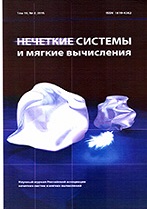|
Human-intelligent systems and features of their functioning
N. Yu. Mutovkina, N. A. Semenov
Tver State Technical University, Tver
Abstract:
The essence of human-intelligent systems is revealed in the work, their composition and structure are considered. The basis for the functioning of a human-intelligent system is the anthropocentric approach. In human-intelligent systems, people, decision support systems and expert systems organically complement each other, using obvious advantages. People support a human-intelligent system in the target state, they are the leading link in the system, organizing its work, formulating and solving particular problems. The software components of the human-intelligent system perform reinforcing and advisory functions. The problematic of decision-making in human-intelligent systems is described, conditioned by the subjectivity and ambiguity of the activity of participants in the system. The concepts of vague goals, limitations and decisions in human-intelligent systems are studied, an attempt is made to develop a general theory of iterative processes of interaction and decision-making, which to varying degrees include vagueness and uncertainty. A numerical example of the iterative process of interaction in an abstract human-intelligent system is given. The problem of revealing control actions, allowing to find the best solution of the creative problem more quickly, is considered.
Keywords:
human-intelligent system, multitude, condition, management influence, decision-making, uncertainty, vagueness.
Received: 17.09.2017
Revised: 12.12.2017
Citation:
N. Yu. Mutovkina, N. A. Semenov, “Human-intelligent systems and features of their functioning”, Nechetkie Sistemy i Myagkie Vychisleniya, 12:2 (2017), 121–131
Linking options:
https://www.mathnet.ru/eng/fssc28 https://www.mathnet.ru/eng/fssc/v12/i2/p121
|

| Statistics & downloads: |
| Abstract page: | 267 | | Full-text PDF : | 200 | | References: | 43 |
|




 Contact us:
Contact us: Terms of Use
Terms of Use
 Registration to the website
Registration to the website Logotypes
Logotypes








 Citation in format
Citation in format 